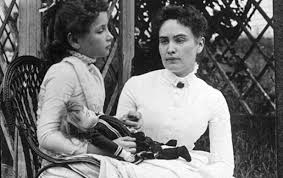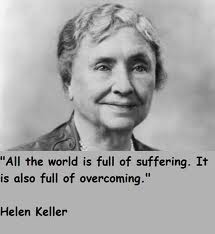This week we have been discussing G.T. Couser’s chapter of his book “Signifying Bodies” titled Rhetoric and Self-Representation in Disability Memoir. I found the analysis of “conventional” (33) versus the “counter-hegemonic” (31) or “post-colonial” (46) kinds of rhetorics of disability memoir really interesting. I had never thought of disability memoirs as having so many different ways of writing or story-telling. I, like many other people, always saw disability memoirs as what they are traditional thought of as—triumph over a “depressing” disability. It is seen as a kind of “inspiring” (33) story that many readers would be able to relate to in its sense of overcoming an obstacle. This made me think if Helen Keller’s story, which is probably one of, if not the most, famous American disability memoir, and is written in this traditional way. In all the different summaries I read of her memoir, which is titled The Story of My Life, all of them mention how it is a “triumph” over her disabilities, or an “overcoming.” For example, the summary on Amazon.com says it is “a remarkable account of overcoming the debilitating challenges of being both deaf and blind.” http://www.amazon.ca/The-Story-My-Life-Restored/dp/0812968867
Curious to know more about Helen’s memoirs, I came across this article (http://www.biographile.com/a-life-beyond-miracles-what-you-dont-know-about-helen-keller/20025/) which reveals that there is much more that encompassed Helen’s life than her famous memoir of “overcoming” her difficulties. The article mentions that Helen’s life is documented by a number of memoirs and biographies. One of her other lesser-known memoirs, The World I Live In, is a much more personal, “intellectually ambitious” and philosophical memoir. In it, she reflects on the “larger human condition,” looking at her disability in a group sense, instead of separating herself from others to show her personal success. Even though this memoir was more true to her life experience than her more famous The Story of My Life, it was out of print for almost one hundred years.
These two versions of memoir are perfect examples of the rhetorics that Couser discusses. The Story of My Life is an example of rhetoric of triumph, and shows its limitations as usually being misrepresentative of the individuals’ actual experience, and “removing” the stigma only from the individual, not others who share the condition (Couser 34). The World I Live In can be seen as an example of rhetoric of emancipation. It shows that disability is not an individual flaw, but a concept that is socially constructed by a normative culture and forced on disabled people (Couser 38). It is more “physiological,” with a focus on a group mindset.
You may then ask, why was The Story of My Life much more popular and readily published than her other memoir? This just goes to show that society has this set group mentality that a disability is something that one must work hard to overcome, and that you have not worked hard enough if you were not able to “overcome” it. I think that a memoir based on triumph is also more relatable to a broader audience, and it is therefore more popular to read. This is a bias that needs to be changed if we ever want to end this marginalization and societal framing of disabled people.



Helen Keller does seem like a perfect example of Couser’s ideas. She is so often presented as the “model” person with disabilities, completely separate from both other people with disabilities and our desire to consume her life in ways that we want to, not ways that she wants to tell it. I’m glad that you bring attention to the role of the audience in the production of life narratives. Though it’s uncomfortable at times, I think it’s important to examine our motivations behind seeking out works of marginalized groups that we don’t belong to– sometimes we could be part of the problem.